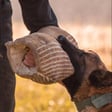
Brian - DEA Supervisory Special Agent
Sometimes experiences in youth mold us more than we know. Brian saw the effects that drugs were having on some of those around him at a young age and decided a career in law enforcement was what he wanted. With a few degrees in criminal justice and human resources under his belt, he began as a local police officer but the next step was closer than he realized. Fast forward 23 years and Brian was ending his career as a DEA Supervisory Agent. This interview is as solid as it gets and at times, is a bit raw; thats life. We discuss the addiction epidemic, Drug cartels, the supply and demand side of the drug problem, DEA pay, beneficial skillsets, and what a DEA agent will do to infiltrate and disrupt the drug scourge on our society. We also discuss Brians work in training and drug education after his long career with the DEA. Brians links can be found below. Thanks Brian!
Brian can be found at www.eagle6training.com or www.only2mg.com
If you found this episode enjoyable/helpful and would like to support the show, you can do so HERE. Thanks!



















